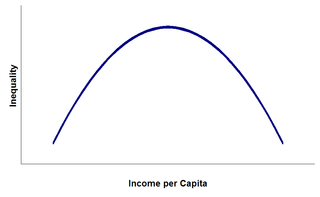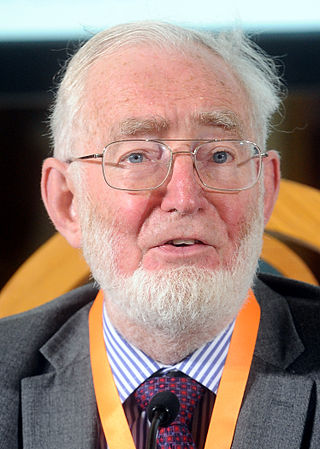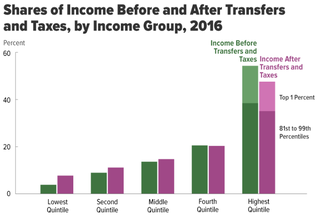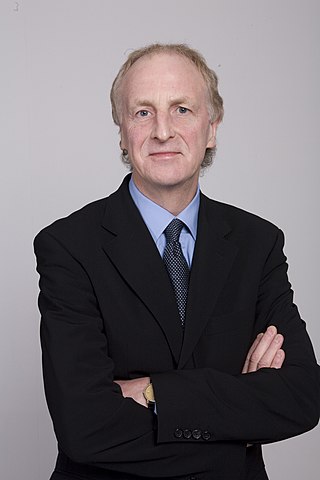Development economics is a branch of economics that deals with economic aspects of the development process in low- and middle- income countries. Its focus is not only on methods of promoting economic development, economic growth and structural change but also on improving the potential for the mass of the population, for example, through health, education and workplace conditions, whether through public or private channels.

Economic inequality is an umbrella term for a) income inequality or distribution of income, b) wealth inequality or distribution of wealth, and c) consumption inequality. Each of these can be measured between two or more nations, within a single nation, or between and within sub-populations.

In economics, income distribution covers how a country's total GDP is distributed amongst its population. Economic theory and economic policy have long seen income and its distribution as a central concern. Unequal distribution of income causes economic inequality which is a concern in almost all countries around the world.
Income inequality metrics or income distribution metrics are used by social scientists to measure the distribution of income and economic inequality among the participants in a particular economy, such as that of a specific country or of the world in general. While different theories may try to explain how income inequality comes about, income inequality metrics simply provide a system of measurement used to determine the dispersion of incomes. The concept of inequality is distinct from poverty and fairness.

The Kuznets curve expresses a hypothesis advanced by economist Simon Kuznets in the 1950s and 1960s. According to this hypothesis, as an economy develops, market forces first increase and then decrease economic inequality. The Kuznets curve appeared to be consistent with experience at the time it was proposed. However, since the 1970s, inequality has risen in the US and other developed countries, which invalidates the hypothesis.

International inequality refers to inequality between countries, as compared to global inequality, which is inequality between people across countries. International inequality research has primarily been concentrated on the rise of international income inequality, but other aspects include educational and health inequality, as well as differences in medical access. Reducing inequality within and among countries is the 10th goal of the UN Sustainable Development Goals and ensuring that no one is left behind is central to achieving them. Inequality can be measured by metrics such as the Gini coefficient.

Sir Anthony Barnes Atkinson was a British economist, Centennial Professor at the London School of Economics, and senior research fellow of Nuffield College, Oxford.

Income inequality has fluctuated considerably in the United States since measurements began around 1915, moving in an arc between peaks in the 1920s and 2000s, with a 30-year period of relatively lower inequality between 1950 and 1980.

Social inequality occurs when resources in a given society are distributed unevenly, typically through norms of allocation, that engender specific patterns along lines of socially defined categories of persons. It poses and creates a gender gap between individuals that limits the accessibility that women have within society. The differentiation preference of access to social goods in the society is brought about by power, religion, kinship, prestige, race, ethnicity, gender, age, sexual orientation, and class. Social inequality usually implies the lack of equality of outcome, but may alternatively be conceptualized in terms of the lack of equality in access to opportunity. This accompanies the way that inequality is presented throughout social economies and the rights that are skilled within this basis. The social rights include labor market, the source of income, health care, and freedom of speech, education, political representation, and participation.
The Brooks World Poverty Institute (BWPI) is a research centre at the University of Manchester dedicated to multidisciplinary research on poverty, inequality and growth. It was established in 2005 following the donation of £1.3 million to the university by the Rory and Elizabeth Brooks Foundation, one of the largest known gifts to fund poverty research in Europe. In September 2008, the Foundation awarded a further £1.4 million to the Brooks World Poverty Institute over three years and in June 2012, a further £1 million.

Anthony F. Shorrocks is a British development economist.

Erik Thorbecke is a development economist. He is a co-originator of the widely used Foster-Greer-Thorbecke poverty measure and played a significant role in the development and popularization of Social Accounting Matrix. Currently, he is H. E. Babcock Professor of Economics, Emeritus, and Graduate School Professor at Cornell University.
Income inequality in the Philippines is the extent to which income, most commonly measured by household or individual, is distributed in an uneven manner in the Philippines.
China's current mainly market economy features a high degree of income inequality. According to the Asian Development Bank Institute, “before China implemented reform and opening-up policies in 1978, its income distribution pattern was characterized as egalitarian in all aspects.”

Rolph Eric van der Hoeven is emeritus professor on employment and development economics at the International Institute of Social Studies in The Hague and was appointed in 2009 as a member of the Committee on Development Cooperation of the International Advisory Council (AIV) to the Dutch Government. Dr. van der Hoeven is a member of the Board of Trustees of the KNCV Tuberculosis Fund.
Sanjiv M. Ravi Kanbur, is T.H. Lee Professor of World Affairs, International Professor of Applied Economics, and Professor of Economics at Cornell University. He worked for the World Bank for almost two decades and was the director of the World Development Report.
In developmental economics, the Poverty-Growth-Inequality Triangle refers to the idea that a country's change in poverty can be fully determined by its change in income growth and income inequality. According to the model, a development strategy must then also be based on income growth and income inequality. The Poverty-Growth-Inequality Triangle model was created by François Bourguignon, the former Chief Economist (2003-2007) of the World Bank.

Effects of income inequality, researchers have found, include higher rates of health and social problems, and lower rates of social goods, a lower population-wide satisfaction and happiness and even a lower level of economic growth when human capital is neglected for high-end consumption. For the top 21 industrialised countries, counting each person equally, life expectancy is lower in more unequal countries. A similar relationship exists among US states.

The Department of International Development (DID), formerly known as King's International Development Institution, is an inter-disciplinary development department located within the Faculty of Social Science and Public Policy in the School of Global Affairs at King's College London. DID was launched in 2013 with a focus on the phenomena faced by middle-income developing countries. DID is a young, innovative, and contemporary development studies department that is the first research centre in the UK that mixes development studies and emerging markets. Its research revolves around development theory, political economy, economics, business, management, geography, and social policy.

Jason Edward Hickel is an Eswazi anthropologist and professor at the Autonomous University of Barcelona. Hickel's research and writing focuses on economic anthropology and development, and is particularly critical of capitalism, neocolonialism, as well as economic growth as a model of human development.












